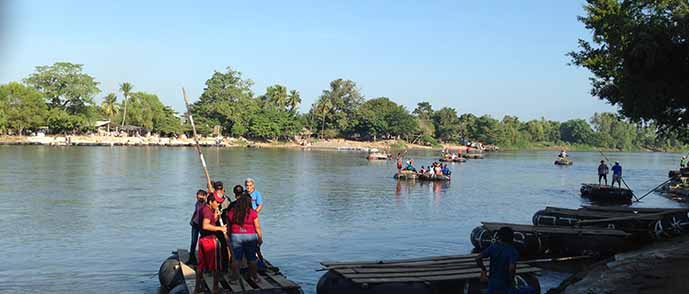Guadalajara, Mexico, September 10, 2021 – The migratory phenomenon is extremely dynamic. The social, political, economic, and health context, natural disasters, and insecurity cause sudden changes in the lives of people on the move: migrants, asylum seekers, refugees, and internally displaced persons. Recently, we have witnessed, through the chronicles of the media, circumstances that violate the rights of people on the move in the northern and southern borders of Mexico. The resumption of the “Migrant Protection Protocols” (MPP), the application of Title 42, the deportation of Central Americans from ICE detention centers in the United States to southern Mexico by air and their transfer by land to Guatemala, the delay in the resolution of the migration procedures in Tapachula and the repression of those in despair have made visible what was unknown to many; they will have devastating consequences for many people who have dared to take risks in search of a decent life and show the inconsistency of immigration policies by the Mexican government.
Migration to and from Mexico until a few years ago was regulated by the National Population Law, and it was not considered as an issue in which the specific intervention of the State was necessary. In 2011, the National Migration Law was promulgated, which, following international conventions and legislation, establishes the responsibility of the State to guarantee order, regularity and security of emigration, immigration, transit, and return in the national territory. The actions or omissions of the Mexican governmental institutions in the matter of migrations respond to conjunctural events. In contrast, US immigration policy has been consistent over the past fifteen years. President Biden’s politically correct rhetoric differs from former President Trump’s xenophobic discourse; however, in practice, both administrations carry out the same actions. The recent Supreme Court ruling to allow the re-establishment of the controversial Migrant Protection Protocols program shows that quotas in the United States asylum system and the fight against irregular immigration prevail regardless of the party in power.
Undoubtedly, the crisis caused by a large number of people, mostly from the northern countries of Central America, waiting in some cities in northern Mexico to request asylum in the United States under the unclear rules of the Protocols Protection of Migrants, has marked the immigration agenda for the last two years. This week a new situation has arisen, the new migrant caravans that have been brutally repressed by the National Guard and the National Migration Institute, reveal a reality that had been made invisible. Thousands of migrants of different nationalities, including a large number of Haitians, have been stranded in Tapachula for months, waiting for a document that allows them safe transit through the country. This has led to overcrowding in the city, overflowing shelters for migrants and asylum seekers, despair over having nowhere to live, what to eat, and health problems. This situation, which goes beyond the authorities of the three levels of government, has caused many other difficulties for both the local population and the migrants.
Faced with this new situation, President López Obrador declared in his morning conference on Thursday, September 2: “The purpose is to keep them in the south of the country because allowing them to cross the country means many risks of human rights violations, especially on the northern border, unfortunately, there are such antecedents.” However, it is incongruous to protect migrants by repressing them, condemning them to desperate survival situations and generating xenophobia among local people.
While governments implement restrictive measures to order, regulate and guarantee the safety of migratory flows, attention to the urgent needs of migrants falls on civil society organizations, many of them inspired by the social doctrine of the Catholic Church. In his magisterium, Pope Francis continually invites Catholics, governments, and people of goodwill to welcome, protect, promote and integrate migrants, refugees, and displaced persons.
In the current convulsed situation on the southern border of Mexico, the Church of Tapachula has taken the initiative to be in solidarity with the needs of migrants. In his Sunday statement on the current migration crisis, Bishop Jamie Calderón invited the entire diocesan Church to try to continue doing the best they can to lighten the weight of the cross for these brothers battered by poverty, violence, and helplessness. The Church’s action contrasts with government policies that restrict the possibility of accessing refugee status and combat irregular migration.
Fr. José Juan Cervantes, c.s.
Source: https://www.facebook.com/casascalabriniguadalajara/posts/1730332113843072


